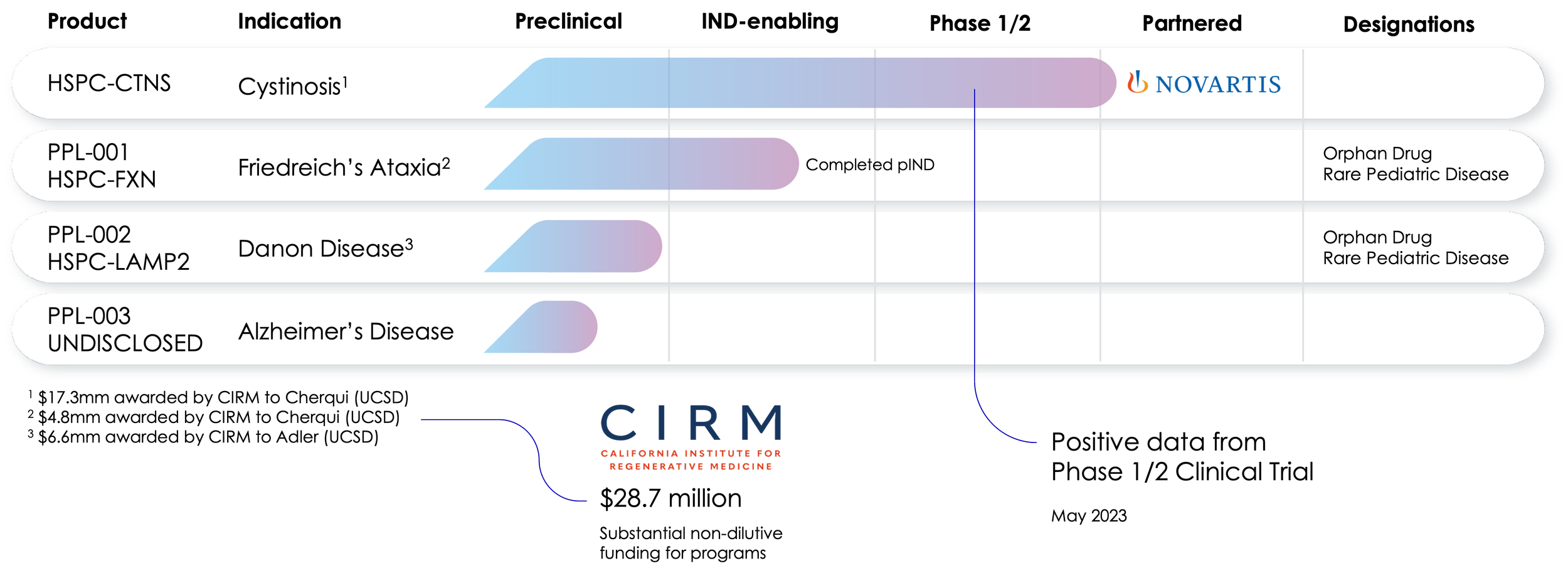
Pipeline
We are advancing a pipeline of multi-systemic genetic medicines directed at the underlying causes of inherited disease, targeting neurodegenerative disorders with Friedreich’s ataxia as our lead indication.
Our clinical stage program, a gene modified hematopoietic stem and progenitor cell (HSPC) therapy for treatment of Cystinosis, reported positive data in a Phase 1/2 clinical trial and is being advanced by Novartis.
about ppl-001
PPL-001 is an experimental gene-corrected CD34+ hematopoietic stem and progenitor cell (HSPC) therapy. This therapeutic’s novel approach utilizes targeted excision to correct the GAA repeat expansion in Intron 1 of the FXN gene. More than 95% of individuals with Friedreich’s ataxia have a GAA repeat expansion as the disease-causing mutation, leading to systemic loss of frataxin protein. In preclinical studies, PPL-001 has been shown to improve disease phenotype in the affected tissues. This unique multi-systemic approach to treat patients with Friedreich’s ataxia, in which multiple organ systems are targeted simultaneously, offers the potential to modify and reverse disease progression. PPL-001 research is funded in part by grants from the California Institute for Regenerative Medicine (CIRM), Friedreich's Ataxia Research Alliance (FARA) and National Institutes of Health (NIH). The principal investigator is Stephanie Cherqui, Ph.D., professor of pediatrics and director of the Gene Therapy Initiative at the University of California, San Diego.
about friedreich’s ataxia
Friedreich's ataxia is a rare, inherited neurodegenerative disorder that affects multiple tissues throughout the body including the central nervous system, heart, eyes, skeletal muscle, pancreas and more. Characterized by progressive loss of coordination and muscle strength, Friedreich’s ataxia often leads to difficulties with walking, speech and other motor functions. This condition is caused by mutations in the FXN gene, resulting in reduced production of a vital protein called frataxin. Patients typically begin experiencing symptoms in childhood or adolescence and experience significant disability over time.
about ppl-002
PPL-002 is an experimental gene-modified CD34+ hematopoietic stem and progenitor cell (HSPC) therapy for the treatment of Danon disease. This therapeutic is designed to express functional Lamp-2 protein, which is critically deficient in people living with Danon disease. In preclinical studies, PPL-002 has been shown to improve disease phenotype in the affected tissues. PPL-002’s treatment approach involves targeting multiple organ systems simultaneously in patients, offering the potential to modify and reverse disease progression. PPL-002 research is funded in part by the California Institute for Regenerative Medicine (CIRM). The principal investigators are Eric Adler, M.D., clinical professor of medicine and medical director of the heart transplant program, and Stephanie Cherqui, Ph.D., professor of pediatrics and director of the Gene Therapy Initiative, at the University of California, San Diego.
about Danon disease
Danon disease is a rare, X-linked genetic disorder caused by mutations in the LAMP2 gene, leading to the accumulation of autophagic vacuoles in cells, primarily in the heart and skeletal muscles. This condition typically manifests in adolescence or early adulthood. Patients experience a range of life-threatening symptoms, including severe cardiomyopathy, physical impairment and retinal abnormalities. Danon disease progresses rapidly, often resulting in life-threatening complications such as heart failure and arrhythmias.

